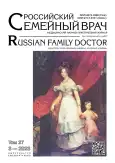The problem of toxoplasmosis in outpatient practice. Part III. Toxoplasmosis in pregnants and congenital toxoplasmosis
- Authors: Vasiliev V.V.1,2, Rogozina N.V.2, Ivanova R.A.2,3
-
Affiliations:
- North-Western State Medical University named after I.I. Mechnikov
- Pediatric Research and Clinical Center for Infectious Diseases of Federal Medical and Biological Agency
- Academician I.P. Pavlov First St. Petersburg State Medical University
- Issue: Vol 27, No 3 (2023)
- Pages: 5-11
- Section: Lectures
- URL: https://journal-vniispk.ru/RFD/article/view/148258
- DOI: https://doi.org/10.17816/RFD568292
- ID: 148258
Cite item
Abstract
Congenital toxoplasmosis is a consequence of acute toxoplasmosis in a pregnant woman. When assessing the risk of сongenital toxoplasmosis during pregnancy, methods for determining specific antibodies, the genetic material of the pathogen (polymerase chain reaction method), immunoglobulins G avidity are used. Molecular genetic methods have the greatest diagnostic value in the diagnosis of сongenital toxoplasmosis in children of the first year of life. Drug prevention of сongenital toxoplasmosis in Russia can be implemented with the use of spiramycin, antenatal therapy is impossible, and postnatal therapy is limited by the list of available antiprotozoal drugs. For the prevention of сongenital toxoplasmosis, the awareness of the population about the ways and factors of transmission of the pathogen is of primary importance.
Keywords
Full Text
##article.viewOnOriginalSite##About the authors
Valerii V. Vasiliev
North-Western State Medical University named after I.I. Mechnikov; Pediatric Research and Clinical Center for Infectious Diseases of Federal Medical and Biological Agency
Email: vcubed@yandex.ru
ORCID iD: 0000-0003-2579-2799
md, dr. sci. (med.), professor
Russian Federation, 41 Kirochnaya St., Saint Petersburg, 191015Natalia V. Rogozina
Pediatric Research and Clinical Center for Infectious Diseases of Federal Medical and Biological Agency
Email: lelekin96@mail.ru
ORCID iD: 0000-0003-0968-6291
md, cand. sci. (med.), assistant professor
Russian Federation, 197022, Saint-Petersburg, ul. Professora Popova, 9Regina A. Ivanova
Pediatric Research and Clinical Center for Infectious Diseases of Federal Medical and Biological Agency; Academician I.P. Pavlov First St. Petersburg State Medical University
Author for correspondence.
Email: reg-iv@mail.ru
ORCID iD: 0000-0003-1809-9443
md, cand. sci. (med.), assistant professor
Russian Federation, Saint PetersburgReferences
- Dubey JP, Murata FHA, Cerqueira-Cézar CK, et al. Congenital toxoplasmosis in humans: an update of worldwide rate of congenital infections. Parasitology. 2021;148(12):1406–1416. doi: 10.1017/S0031182021001013
- Milne GC, Webster JP, Walker M. Is the incidence of congenital toxoplasmosis declining? Trends Parasitol. 2023;39(1):26–37. doi: 10.1016/j.pt.2022.10.003.3
- Garweg JG, Kieffer F, Mandelbrot L, et al. Long-term outcomes in children with congenital toxoplasmosis — a systematic review. Pathogens. 2022;11(10):1187. doi: 10.3390/pathogens11101187
- Melo MS, Cabrera LAA, Lima SVMA, et al. Temporal trend, spatial analysis and spatiotemporal clusters of infant mortality associated with congenital toxoplasmosis in Brazil: Time series from 2000 to 2020. Trop Med Int Health. 2023;28(6):476–485. doi: 10.1111/tmi.13877
- Vasiliev VV, Romanova ES. The problem of toxoplasmosis in outpatient practice. Part I. Toxoplasmosis in immunocompromised patients. Russian Family Doctor. 2023;27(1):15–20. (In Russ.) doi: 10.17816/RFD296574
- Deganich M, Boudreaux C, Benmerzouga I. Toxoplasmosis infection during pregnancy. Trop Med Infect Dis. 2022;8(1):3. doi: 10.3390/tropicalmed801000
- de Barros RAM, Torrecilhas AC, Marciano MAM, et al. Toxoplasmosis in human and animals around the world. Diagnosis and perspectives in the one health approach. Acta Trop. 2022;231:e106432. doi: 10.1016/j.actatropica.2022.106432
- Almeria S, Dubey JP. Foodborne transmission of Toxoplasma gondii infection in the last decade. An overview. Res Vet Sci. 2021;135:371–385. doi: 10.1016/j.rvsc.2020.10.019
- de Oliveira Azevedo CT, do Brasil PE, Guida L, Lopes Moreira ME. Performance of polymerase chain reaction analysis of the amniotic fluid of pregnant women for diagnosis of congenital toxoplasmosis: a systematic review and meta-analysis. PLoS One. 2016;11(4):e0149938. doi: 10.1371/journal.pone.0149938
- Zhou Y, Leahy K, Grose A, et al. Novel paradigm enables accurate monthly gestational screening to prevent congenital toxoplasmosis and more. medRxiv. 2023;2023:04.26.23289132. doi: 10.1101/2023.04.26.23289132
- Holec-Gąsior L, Sołowińska K. IgG avidity test as a tool for discrimination between recent and distant toxoplasma gondii infection-current status of studies. Antibodies (Basel). 2022;11(3):52. doi: 10.3390/antib11030052
- Wilson RD. Acute perinatal infection and the evidenced-based risk of intrauterine diagnostic testing: a structured review. Fetal Diagn Ther. 2020;47(9):653–664. doi: 10.1159/000508042
- Findal G, Helbig A, Haugen G, et al. Management of suspected primary Toxoplasma gondii infection in pregnant women in Norway: twenty years of experience of amniocentesis in a low-prevalence population. BMC Pregnancy Childbirth. 2017;17(1):127. doi: 10.1186/s12884-017-1300-1
- Skvarc M. Diagnostic accuracy of adjusted low IgG avidity index to predict acute Toxoplasma gondii infection in the first trimester of pregnancy. Folia Parasitol (Praha). 2022;69:2022.023. doi: 10.14411/fp.2022.023
- Mandelbrot L, Kieffer F, Sitta R, et al. Prenatal therapy with pyrimethamine + sulfadiazine vs spiramycin to reduce placental transmission of toxoplasmosis: a multicenter, randomized trial. Am J Obstet Gynecol. 2018;219(4):386.e1–386.e9. doi: 10.1016/j.ajog.2018.05.031
- Dunay IR, Gajurel K, Dhakal R, et al. Treatment of toxoplasmosis: historical perspective, animal models, and current clinical practice. Clin Microbiol Rev. 2018;31(4):e00057–17. doi: 10.1128/CMR.00057-17
- Prasil P, Sleha R, Kacerovsky M, Bostik P. Comparison of adverse reactions of spiramycin versus pyrimethamine/sulfadiazine treatment of toxoplasmosis in pregnancy: is spiramycin really the drug of choice for unproven infection of the fetus? J Matern Fetal Neonatal Med. 2023;36(1):2215377. doi: 10.1080/14767058.2023.2215377
- Paltseva AI, Zverko VL, Sinitsa LN, et al. Congenital toxoplasmosis. Clinical observation. Journal of the Grodno State Medical University. 2020;18(5):611–618. (In Russ.) doi: 10.25298/2221-8785-2020-18-5-611-618
- Sotnikov SA, Krjukov EYu, Iova AS, et al. Сlinical report of generalized congenital toxoplasmosis. Journal Infectology. 2014;6(4):87–92. (In Russ.) doi: 10.22625/2072-6732-2014-6-4-87-92
- Loh FK, Nathan S, Chow SC, Fang CM. Vaccination challenges and strategies against long-lived Toxoplasma gondii. Vaccine. 2019;37(30):3989–4000. doi: 10.1016/j.vaccine.2019.05.083
- Barros M, Teixeira D, Vilanova M, et al. Vaccines in congenital toxoplasmosis: advances and perspectives. Front Immunol. 2021;11:621997. doi: 10.3389/fimmu.2020.621997
- El Bissati K, Levigne P, Lykins J, et al. Global initiative for congenital toxoplasmosis: an observational and international comparative clinical analysis. Emerg Microbes Infect. 2018;7(1):165. doi: 10.1038/s41426-018-0164-4
Supplementary files







